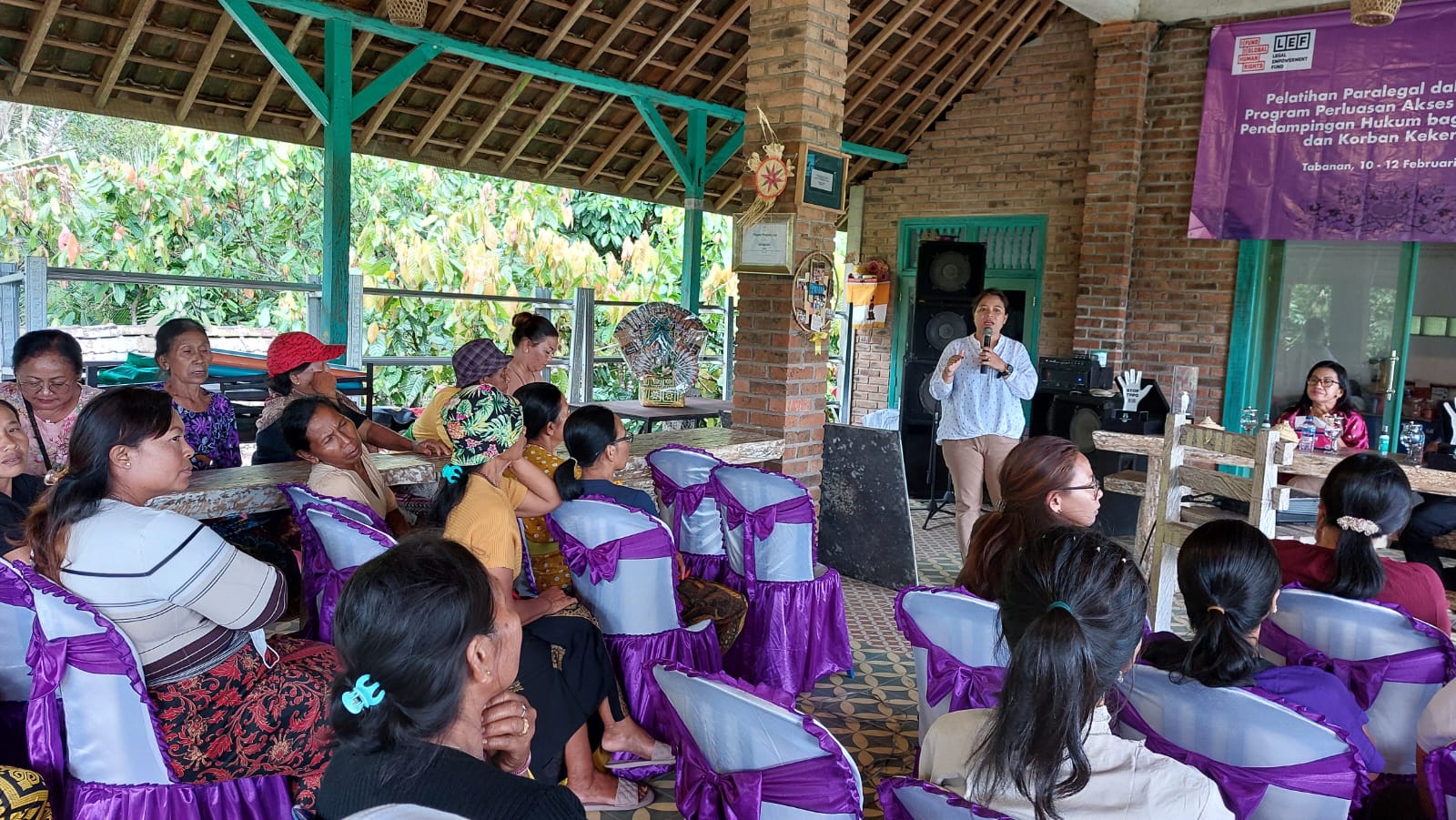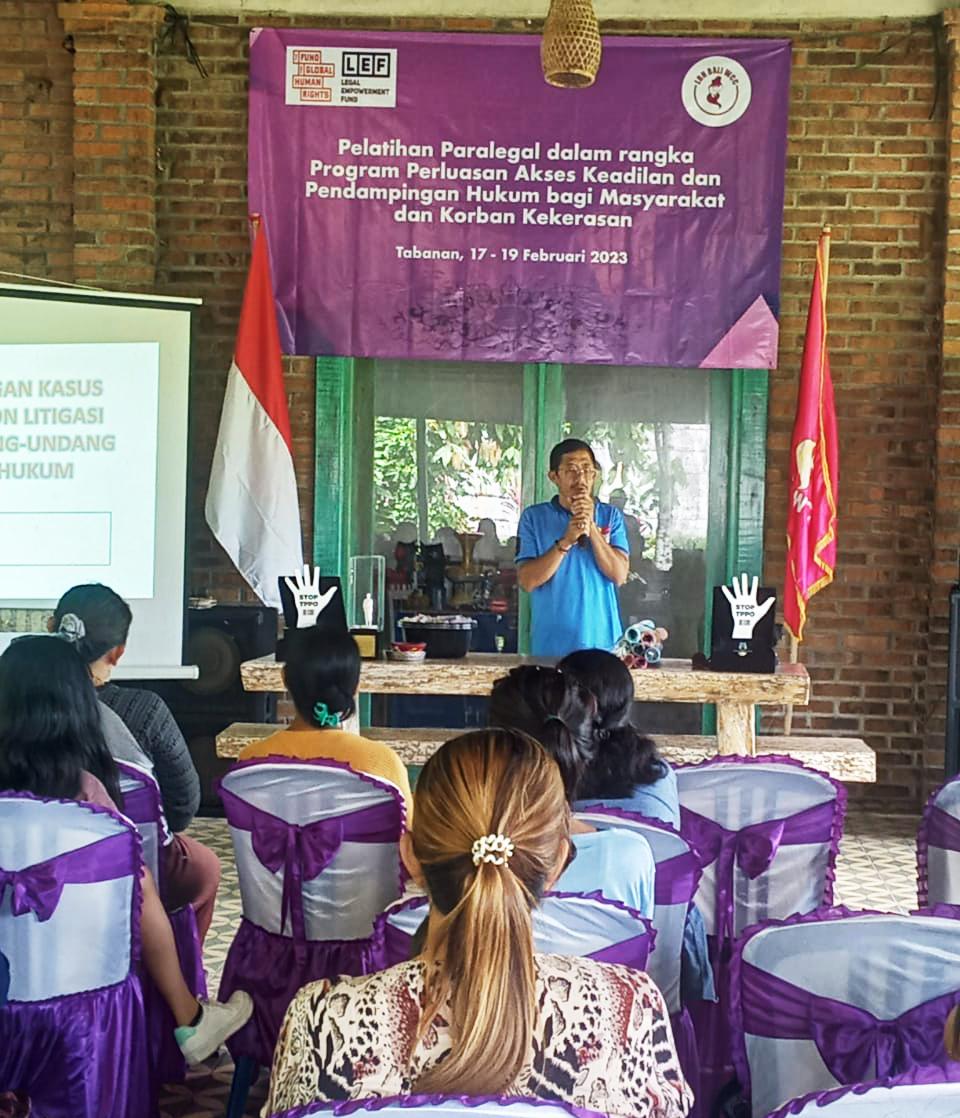The Presence of Paralegals for Assisting Victims of Violence at the Grassroots Level
The Bali Women Crisis Center Legal Aid Institute (LBH BWCC) has conducted paralegal training activities for various elements of local society as a form effort to expand access to justice and legal aid services for the community, especially women and children victims of violence. Until 2023, the number of paralegals currently recruited by LBH BWCC is more than 100 people on duty and spread across several areas in the Province of Bali, especially in remote and rural areas. Paralegals come from various backgrounds, such as members of the general public, community leaders, village officials, traditional leaders, village officials, students and young women, housewives, survivors of violence, and others.
Program for Expansion of Access to Justice and Legal Assistance for Communities and Victims of Violence
In February 2023, LBH BWCC through financial assistance from the Legal Empowerment Fund (LEF) from The Fund for Global Human Rights (United Kingdom), implemented the Program to Expand Access to Justice and Legal Assistance for Communities and Victims of Violence. One of the outputs of the program was the recruitment and training of basic-level paralegals aimed at 60 female paralegals from four districts/cities, namely Badung Regency, Denpasar City, Bangli Regency, and Tabanan Regency. The paralegal training was divided into two batches with 30 participants for each wave. The first batch of training was held on 10-12 February 2023 and the second batch of training was held on 17-19 February 2023, both activities were held at the BWCC stronghold, Tabanan, Bali.

Paralegal training for women paralegals in the WCC stronghold, Tabanan, Bali
Ni Nengah Budawati, Director of LBH BWCC, stated that currently the number of human resources (HR) to assist victims of violence is still limited and unbalanced when compared to the large number of cases that have occurred in Bali. “Thus, we see that paralegal training is important. This starts with women at the grass level who become our bridge in assisting cases for victims and we see that they need to receive training to become paralegals. From this training, paralegals will be able to assist LBH BWCC's future work in handling cases, empowerment, and things that are needed by victims or survivors, as well as society,” said Ni Nengah Budawati.
Basic Level Paralegal Training for Women Paralegals
At the basic level of paralegal training, the trainees receive various training materials, including the General Concept of Paralegal, Recognizing Forms of Gender Inequality, Assistance Assistance, Gender, Human Rights, and Advocacy, Fulfilling the Rights of Victims or Survivors, Cultural Perspectives (Customs) on Women, Community-Based Recovery Systems, and Creative Economy Training.
“This training is important for mothers who have the desire to play an active role as a paralegal. The role of paralegals will help LBH BWCC in the future, especially in handling cases, especially in disadvantaged areas,” said Ni Ketut Madani Tirtasari, LBH BWCC advocate who is also a resource person in training on Community-Based Recovery Systems.

Ni Ketut Madani Tirtasari as the resource person for the paralegal training delivered material about Community-Based Recovery System
Ketut Gunada, a training resource person for Assistance Assistance material said, “This training is useful for participants so that it can help the wider community, especially in handling cases, for example in carrying out mediation with related parties. Through Assistance Assistance material for handling litigation and non-litigation cases, it is hoped that participants can understand the process and flow of case handling.” I Ketut Gunada am currently active as a paralegal under the coordination of LBH BWCC and also works as the Regional Head of Rejasa Village at the Rejasa Village Head Office, Tabanan, Bali. His involvement as a paralegal from village apparatus representatives is strategically an example of LBH BWCC's efforts to invite the participation of village authorities to assist in the handling of legal cases that occur at the grassroots level.
I Ketut Gunada as the resource person for the paralegal training delivered material on Assistance Assistance
The training participants responded positively to the paralegal training provided. One of the training participants from the City of Denpasar, Ni Wayan Riyasmi (47 years), who works daily as a peddler, expressed her enthusiasm in participating in the training, “This training broadens my horizons, even though I have no background in law. There is also creative economy training, flower arranging and building an incense business," he said. Ni Wayan Riyasmi also revealed that in the end, she learned about paralegals and the role of paralegals, especially in assisting victims and survivors. "The hope is that the knowledge gained can be applied when assisting victims or survivors, especially for legal assistance. By participating in this training, I have a better understanding of what forms of violence against women and children are and the flow of reporting when there are legal problems in society," she added.
Another participant, Ni Nengah Arini (46 years) from Badung Regency, who also works as a pitcher trader said that the paralegal training added to her experience in gaining knowledge about the rights of victims or survivors. From this training, he also learned about paralegals and hoped to be able to assist victims. "I hope I can play a role as a paralegal in the future, for example, if there are victims that I know in my environment, I will try to assist them at the initial stage and invite them to consult until the case can be resolved by LBH BWCC," he said.
Becoming a Paralegal and Contributing to Expansion of Access to Legal Aid
According to Permenkumham No. 3 of 2021, a paralegal is anyone from the community, community, or Legal Aid Provider who has attended paralegal training, does not work as an advocate, and does not independently accompany Legal Aid Recipients in court. Paralegals are voluntarily tasked with assisting and cooperating with lawyers or advocates and their existence as a supporting system is important because their role is to facilitate access to justice in society as well as an extension at the grassroots level for legal aid services.
"In recruiting paralegals, LBH BWCC has its own criteria, where the most important thing is the personality of the selected paralegal, for example he must have empathy and care for victims or survivors, be accepted by people in his surroundings, and have a commitment to providing assistance. as well as other criteria. We usually see and observe these personal potentials when providing empowerment activities or training at the community level, which we then invite community members to join our paralegal community," said Ni Nengah Budawati explaining the criteria for paralegals.